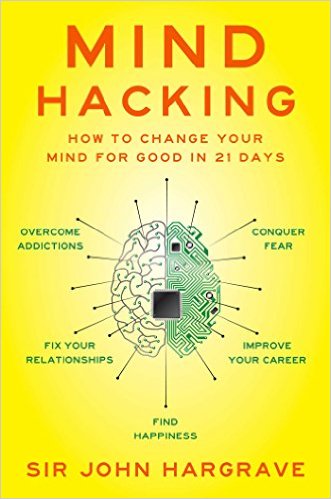
|
FreeComputerBooks.com
Links to Free Computer, Mathematics, Technical Books all over the World
|
|
- Title: Mind Hacking: How to Change Your Mind for Good in 21 Days
- Author(s) Sir John Hargrave
- Publisher: Gallery Books (January 5, 2016); eBook (Creative Commons Licensed)
- License(s): Creative Commons License (CC)
- Hardcover: 240 pages
- eBook: HTML and PDF
- Language: English
- ISBN-10/ASIN: 1501105655
- ISBN-13: 978-1501105654
- Share This:

|
This book teaches you how to reprogram your thinking -- like reprogramming a computer -- to give you increased mental efficiency and happiness.
Have you ever wished you could reprogram your brain, just as a hacker would a computer? In this 3-step guide to improving your mental habits, learn to take charge of your mind and banish negative thoughts, habits, and anxiety - in just 21 days!
A seasoned author, comedian, and entrepreneur, Sir John Hargrave once suffered from unhealthy addictions, anxiety, and poor mental health. After cracking the code to unlocking his mind's full and balanced potential, his entire life changed for the better. In Mind Hacking, Hargrave reveals the formula that allowed him to overcome negativity and eliminate mental problems at their core.
Through a 21-day, 3-step training program, this book lays out a simple yet comprehensive approach to help you rewire your brain and achieve healthier thought patterns for a better quality of life. It hinges on the repetitive steps of analyzing, imagining, and reprogramming to help break down barriers preventing you from reaching your highest potential.
By treating your brain as a computer and mastering Hargrave's mind hacking formula, you, too, can create a positive, permanent shift in your thinking, leading to personal and professional triumphs in all areas of life.
About the Authors- Sir John Hargrave is an author, comedian, and entrepreneur.

- Mind Hacking: How to Change Your Mind for Good in 21 Days (Sir John Hargrave)
- The Mirror Site (1) - PDF
-
 Social Engineering: The Art of Human Hacking (Chris Hadnagy)
Social Engineering: The Art of Human Hacking (Chris Hadnagy)
Reveal and dissect the technical aspect of many social engineering maneuvers, this book does its part to prepare you against nefarious hackers - now you can do your part by putting to good use the critical information within its pages.
-
 Being God (Robin J. Price)
Being God (Robin J. Price)
Searching for enlightenment or just wanting to know the truth? Alex was. But what he finds leaves him reeling and adrift in a strange new reality; where he is God stretching out into infinity.
-
 Finding Your Power to Be Happy: Seven Practices
Finding Your Power to Be Happy: Seven Practices
Learn to find the happiness that is natural to you, and enjoy better relationships, better health, more success and a longer life. This kind of happiness does not require changing anything in your life. All you have to do is learn to turn it on.
-
 Mind Relief Manuscript (Jerry Stocking)
Mind Relief Manuscript (Jerry Stocking)
In this book, the author's simple tricks and exercises that will allow you to quiet your mind, reduce stress and think clearly. You will access mental flexibility and deep inner peace while reading through this fast fun book, guaranteed to lighten your day!
-
 Mind, Body, World: The Foundations of Cognitive Science
Mind, Body, World: The Foundations of Cognitive Science
Introduce the foundations of cognitive science, this book addresses a number of questions currently being asked by those practicing in the field of cognitive science. It highlights the fundamental tensions and lines of fragmentation of cognitive science.
-
 Paths: Why is Life Filled with so many Detours?
Paths: Why is Life Filled with so many Detours?
This book explores the amazing similarity between paths taken by people and many other things in life, and its impact on the way we live, teach and learn. Offering insights into the new scientific field of paths as part of the science of networks, etc.
-
 Train Your Brain: Build a Framework for Clear Thinking
Train Your Brain: Build a Framework for Clear Thinking
This book will help you build a mental framework for clear thinking. With daily practice you can build your skills in clear thinking, and become a more productive and happier person. The basic anatomy of the brain is presented.
-
 What is and What will be: Integrating Spirituality and Science
What is and What will be: Integrating Spirituality and Science
This book integrates science with values and meaning by making the simplest possible assumption about the connection between physical structure and conscious experience. This follows from Gödel's Incompleteness Theorem and the assumptions of this book.
-
 Motivation: How To Enjoy It Every Day (David Valois)
Motivation: How To Enjoy It Every Day (David Valois)
21 Secrets To Get Motivated - Even If You Are In The Most Difficult Situation! Do you want to know what do high motivated achievers that others don't? Then you need MOTIVATION. And here you will discover how.
-
 Why Knowing What To Do Is Not Enough?
Why Knowing What To Do Is Not Enough?
It explains the reasons for the gap between 'knowing' and 'doing', focuses on the role of non-cognitive capacities, such as setting goals, taking action, persevering and coping with setbacks, and shows how these capacities are undermined by adverse circumstances.
-
 Learning from Arguments: An Introduction to Philosophy
Learning from Arguments: An Introduction to Philosophy
The aim is to introduce newcomers to the dynamics of philosophical argumentation, using some of the arguments standardly covered in an introductory philosophy course, but without the additional hurdles one encounters.





